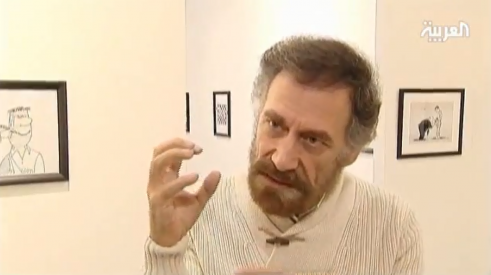Syrian Cartoonist Ali Ferzat Remains Defiant Despite Assault
by Eoin Koepfinger / April 11, 2012 / No comments

Ferzat demonstrates the extent of his right hand’s range of motion at an exhibition of his work in London’s Mica Gallery.
On August 25, 2011, Syrian political cartoonist Ali Ferzat was abducted and severely beaten by masked men as he left his studio in Damascus. The attackers beat Ferzat with batons and dragged him from his car into another vehicle before dumping him on the side of a road less than an hour later. The beating was apparently in retaliation to the artist’s caricatures of Syrian President Bashar al-Assad. Ferzat says his abductors deliberately broke his hands, so that, in their words, “they never dare challenge his masters again.”
Yet, this year Ferzat and his hands may indeed challenge his masters once again. The cartoonist has resumed drawing after multiple operations restored 90% of normal movement to his hands, though he has indicated that his full abilities are still limited.
Ferzat’s relationship with the ruling powers was not always so bitter, however. According to Al Ahram, a weekly Egyptian newspaper, Ferzat and Assad were on friendly terms when the future Syrian president was still an ophthalmologist and a frequent visitor of art exhibitions in the 1990s. Public Radio International reports that, as Assad was preparing to take power, he asked Ferzat and other artists for their input on freedom of speech reforms.
When Assad assumed power after his father’s death, he allowed Ferzat to publish the satirical weekly Al-Domari (“The Lamp-Lighter”) in 2001, making it the first privately-owned Syrian publication after Hafez al-Assad’s almost 40-year ban on independent media. Nevertheless, the paper’s critical coverage of Syrian political affairs is likely the reason its license was revoked and it was shut down in 2003.
Ferzat then began to publish his cartoons online, dedicating hundreds of pieces to satirizing the Syrian government. He believes what caused the 2011 attack on him was “getting personal” by creating recognizable caricatures of actual political figures. In the months leading up to the attack—and at the peak of the Arab Spring, where protesters had taken to carrying his cartoons in demonstrations—depictions of Bashar al-Assad appeared frequently in Ferzat’s cartoons. Ferzat says, “Before, I made sure not to draw any official that could be recognized, even though my cartoons were based on real people. Even if someone in power felt they were being targeted, they wouldn’t say anything because that would be like confirming it really was them.”
Ferzat currently resides in Kuwait, where he has undergone treatment and physical therapy for his injuries. He has since appeared at exhibitions honoring his work, including a London retrospective sponsored by Amnesty International and Mosaic Initiative for Syria at the Mica Gallery. Despite the assault, he has neither abandoned his criticism of Assad’s regime, nor his support of the Syrian Uprising. He even intends to return home from exile at some point. “People are not going to go back to the way they used to live. There is no way you can go back to the way things were before this revolution started,” Ferzat said in a March interview with Reuters. “Every day I say I will go back to Damascus. Every day people say to me, ‘Don’t go back, it’s too dangerous.’ One of these days I am just going to do it, because the reality is I can’t stay away from my country for much longer.”
Watch Ali Ferzat speaking about his injuries and his hopes for the Syrian Revolution:




